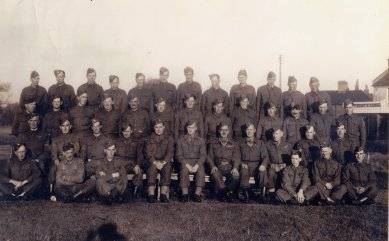
14th May 1944
|
Itteringham.com
|
We hope to identify all those in the pictures below, so if you recognise someone as yet unidentified, let us know and we will update the site. Let your cursor rest on each person's head and if we know their name, the label will appear. If you recognise someone unlabelled please do let us know - contact details at the bottom of this page. |
|
Home
Guard
|
The
Home Guard started life as the Local Defence Volunteers but were
not well equipped by the military planners, who for some time did not believe
an invasion was likely. Arms and uniforms were not supplied for all recruits
until 1944 - units were then stood down in December! Scares of invasion
were met with common sense sceptism in the village with at least one volunteer
taking time to shave before turning out! |
 |
| Itteringham & Erpingham
Home Guard (+ other volunteers)
on Aldborough Green.
14th May 1944 |
We had a fright once. They said that
the Germans were invading... Weybourne which was wrong...and the Home Guard
started to march towards Weybourne with shovels and forks and all sorts
of things cause they hadn't got any guns then. Ruth Harrison |
In
1936 Mr Cossey Skinner and his wife Win lived in the Manor House. Mr.
Skinner was in the Home Guard. They used the front lawn on Sunday mornings
to drill and lay out equipment. |
|
A lady used to come
and give demonstrations in the village hall. One poor man fainted while
practising the bandaging. W.S. |
|
Many
villagers, both men and women did "Fire Watching." Cups of
tea were available from the old bakehouse in the centre of the village.
|
|
My husband was in the Home Guard...no not in the
Home Guard - in the ARP. He called it the IRP and not the ARP (laugh)... |
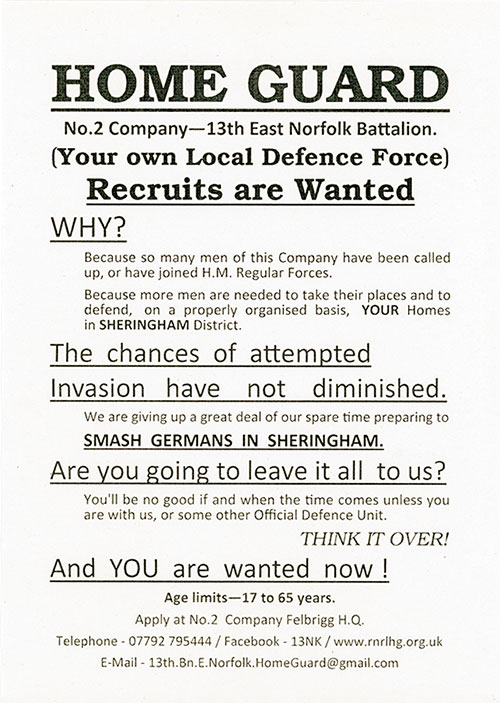 |
The Itteringham No. 7 Company needs YOU! |
|
Evacuees
|
|
The
school was made ready for evacueees in October 1939. Several of the
villagers looked after the children but some returned to their families
despite the danger. |
|
I had some evacuees.
They came quite early. Poor little souls, they did look wrecks some
of them. I
had two from Gravesend and they were a couple of little monkeys...
they were sitting outside the gate which
joined the churchyard gate and Reverend Summers came down the road and
he says, "Are you coming to church this morning?" Beryl said
"No I'm not!" So
he said, "Well, where do you go on Sunday when you're at home?"
She said, "We go to the pub with father
and we sit on the step and wait till he comes out." Ruth Harrison |
|
They were a couple
of rough 'uns. They stayed with me till about a year before the war
finished and then they, Mrs. H. their mother, took them home cause Beryl
was getting a bit out of hand. I missed them, I missed them a lot. Ruth Harrison |
|
The little boy used
to go down to the river every night. He'd only got one pair of trousers
and he used to come home wet through.
I used to have to dry the trousers every night... Just paddling in the
water and all times during the year. He came home one night, I said "What are you wet again? You are a naughty boy!" "Yes," he said, "Don't put me to bed Auntie, give me a damn good hiding!" He'd rather have a damn good hiding than go to bed...I suppose that was what he'd been used to, I don't know? ...I didn't give him one... Ruth Harrison |
|
His mother sent him
another pair of trousers after a bit so he had on pair on and one off
but otherwise I used to have to wash them out Saturday nights and dry
them Sundays, oh dear. We had a lot of accidents round here at that
time. Then things started getting worse, some of them went home. Ruth Harrison |
|
Military
|
|
The
nearest airfield was the fighter base at RAF Matlaske. The NCOs' and
airmens' messes were at Barningham Hall but all the officers were billeted
at Itteringham Mill. The transport from Matlaske to Itteringham was
by bicycle. Further details are recorded on the Mill
Page. |
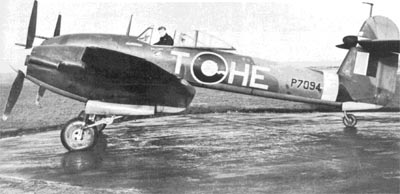 |
|
Westland
Whirlwind P7094 c.1943
|
| After a forced landing near Matlaske, when returning to base on 23rd December 1941, this aircraft was transferred from No. 137 squadron to No. 263 squadron after repair, almost a year later. Flying as HE-T it was wrecked on 16th May 1943 after 166 flying hours. |
|
On 29th May 1942, a Westland Whirlwind from Matlaske piloted by P/O
Jowitt arrived over the airfield at 06:00 hours. When at about 800 ft,
his port engine caught fire and the aircraft went into a spin. Jowitt
baled out and conviently landed outside the officers' mess in time for
breakfast! The plane crashed in the watermeadows by the bridge near
Bintry Farm. The aircraft was No. P7118 of 137 squadron and had flown a total of 111 hours. The aircraft was named 'Bellows 4' which indicates it was one those purchased by the Argentinian company Bellows, who donated four Whirlwinds to the RAF. It's believed the wreckage was excavated by an aviation museum after the war. |
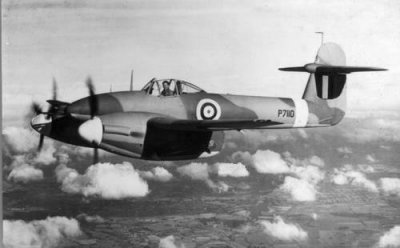 |
|
Westland
Whirlwind P7110 in 1941
This aircraft was of the same type as those stationed at Matlaske photo supplied by www.ww2images.com |
|
There was a plane crashed
just over the bridge, alongside of the river, on the Common side of
the bridge, on the bend. If you look you can see, on the bend, it went
down the bank. Ruth Harrison |
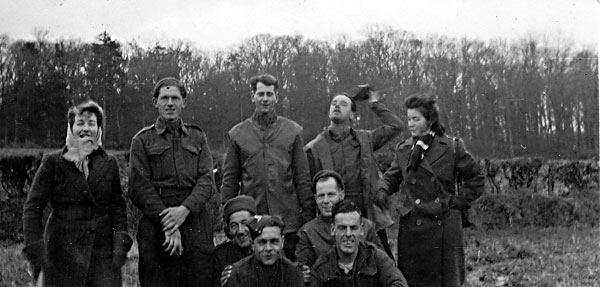 |
|
Searchlight boys - January 1943 Standing left to right: Nancy Lusher, Fred, Ron, Jim, Kay Denyer Front: Jack, Charlie, Bill, 'Appy' |
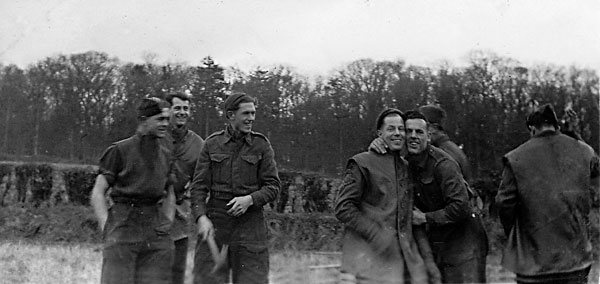 |
| Searchlight boys - January 1943 Left to right: Bill, Ron, Fred, Charlie, 'Appy' With backs turned: Jack, Jim |
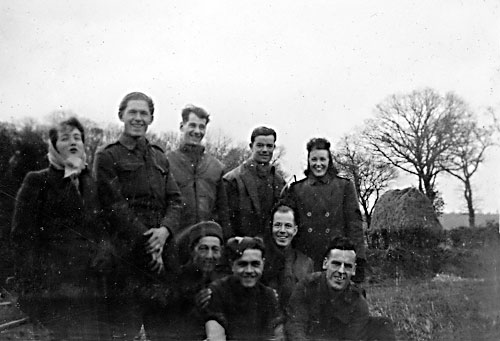 |
Searchlight boys - January 1943 Standing left to right: Nancy Lusher, Fred, Ron, Jim, Eileen Stone Front - Jack, Charlie, Bill, "Appy" |
|
Home
Front
|
|
It was awful. We had
a rough old time, especially when they were bombing Coventry because
there were troops up on the park at Wolterton, there were troops at
Barningham Hall and there was the airforce at Oulton. We were in the
middle of the lot... they used to put the searchlights up and you could
see the planes in the searchlight. They fired at them, bits of shrapnel
would come down sometimes. We had bombs one night come down, they started
just over the bridge and they missed the farmhouse, Hill farmhouse and
dropped further afield on the road where you go down from Aylsham to
the Common. Ruth Harrison |
|
Some of them (bombs)
fell in that plantation up there. We had it pretty near sometimes. My
father was scared stiff of 'em. He worked at that time up on the farm
that joined the arifield, I think it's Harrolds' now. And he came home
one day and he said to my mother "I'll have to have some clean
linen, some clean clothes." She said he'd been hiding behind a
row of wire netting while they machine gunned the airfield and that
frightened him (laughter). Ruth Harrison Possibly evening of 29th October 1940 when 5 Dornier 17 bombers bombed and machinegunned the area. |
Tom
Baxter had a miraculous escape one day, when he decided to walk home for
his dinner. On his return a large bomb crater was where he had left his
bicycle. Had he not decided to go home, Tom would have been no more. |
We didn't have official shelters, we had shelters that they made themselves, you know. We had a pigs' house lowered down; they dug a big hole and lowered the pigs' house down and used to have to go down three steps to get into it, down deep. But don't think that was a bit of good really because had anything dropped we should have had it, shouldn't we? I know my brother was home on leave, he was minesweeping off the Naze and he was home on 48 hours leave and he was so tired because they'd been, you know, doing it all the while. He went to bed soon as he got home and of course out go the sirens. My mother opened the door and she said, "Boy, you'll have to get up, the siren's out." So he said, "I aren't coming." So he said "I aren't coming, I'm tired." She said, "Well you'll have to come, we're going to the shelter." So he said "Well you can go, I'll stay here." But she wouldn't go without him. She always used to carry her handbag on her arm with the rent in. She said if the house went down she'd got the rent money with her. So we went off and she wouldn't give me any rest when we went down; I said, "You'll have to get up boy, we've got no peace up there." So he got up and she was waiting for him just out in the yard, so she walked in front of him as we were going up the garden and a chandlier flare came out, lit everywhere up like daylight. 'Course we started to trot, to run to get down the dug-out and instead of going down, she fell down, went down head first. So my brother said, "What on earth do you think you're up to?" She say, "I always go down here like that." He say, "Well, the Lord know what you do when you're in a hurry then." (laughter) Poor old soul. Ruth Harrison |
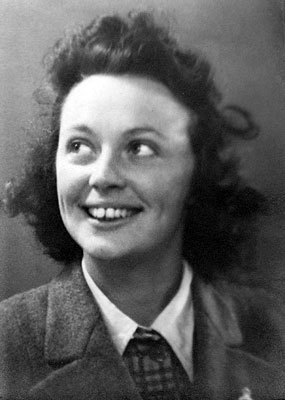 |
Eileen Stone - 1941 |
I called in at the village_shop in early October and mentioned that my mother Eileen Stone was a Land Girl at White_House_Farm, from November 1941 till February 1943. I promised I would send copies of the snap shots but there are so many of them, most with descriptions on the back, that it has taken me a while to sort through! Some are of the farm, others of the area and one or two of local people: Mr & Mrs Lake with children Tommy and Mary at White_House_Farm, Mrs Curtis the Post Woman, Mr & Mrs Douglas of 64 Woodgate and the Regis family (Mrs Regis, Lois, Peggy, baby Reggie, Lynn, Mike and young Lou) from the Mill House. There are two group photos of the Searchlight Boys but they are only given first names. There is also a photograph of Daisy and Rosa Heward at their home, O'Fids, Hall Road Cromer. One of the Miss Hewards ran the YMCA at Cromer. I have three letters Mum wrote to my father from the farm, and I have extracted relevant bits from those. It is pity there are not more letters from Itteringham, as I have a huge archive of wartime letters and diaries from both my parents but those three are the only survivors from Norfolk. Mum, at her request, was transferred back home to a farm in West Sussex in 1943. My father was a PoW in Stalag Luft III, involved in a very minor way, in the Great Escape. Theirs is quite a love story and they were married a month after his return to the UK in June 1945. Leigh Lawson - 1st December 2011 |
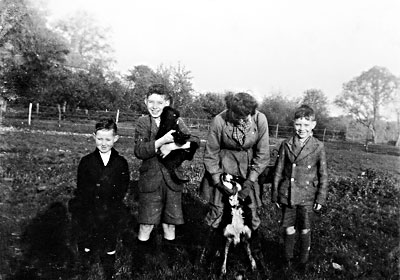 |
Regis boys from Blickling Mill House - November 1942 Lynn, Mike and Lou Regis with Kay, Rover and Gussie |
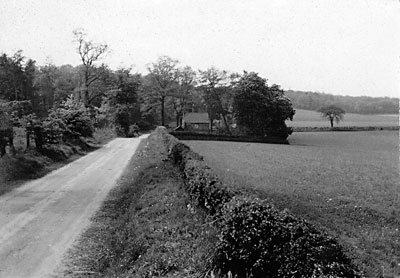 |
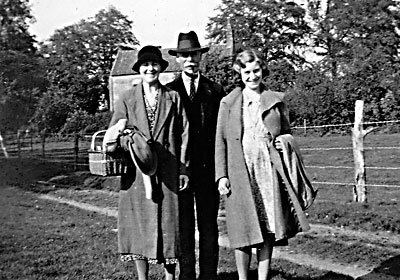 |
|
64 Woodgate, Blickling -1942 |
Mr & Mrs Douglas & daughter from 64 Woodgate -1942 |
|
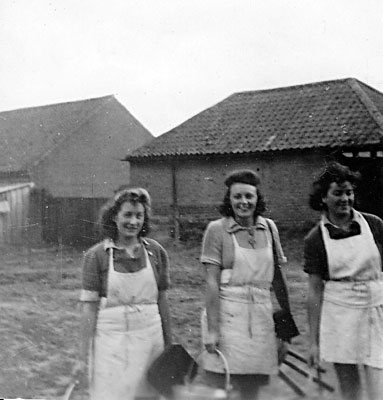 |
Nancy Lusher, Eileen Stone & Kay Denyer milking - 1942 |
According to a recording of my father talking for an oral history project in 2003, on leaving Plumpton Agricultural College in Sussex, Eileen Stone and Kay Denyer requested to go to an isolated farm. Their wish was to be as deep in the countryside as possible. They were first billeted with Mr & Mrs Douglas who lived at 64 Woodgate, Blickling. It was so cold and damp in the beds that sometimes the girls slept in their mackintoshes. They used the tepid water from their hot water bottles to wash in, when there was ice on the washing water in the jug. They were very relieved when a month later, a room was found for them to share in the farmhouse at White House Farm. It was a ground floor room, and they used to go in and out through the window rather than use the front door and go through the house! Some of the men working on the farm made it hard for them at first, deliberately leaving things lying around for them to trip over etc, but the girls took everything in good part and were eventually accepted. Eileen remembered being told to go into the pen with the bull to brush his coat - which she did without hesitation. She wasn't one to give up easily and I think she impressed the men with her spirit. Leigh Lawson - 31st December 2011 |
The following are extracts from letters written by Eileen Stone, from Lyminster, West Sussex, a Land Girl billeted at White House Farm, Itteringham, to her boyfriend Flt Lt Leslie Speller from Littlehampton West Sussex, serving with the RAF in the Middle East. Eileen and her married friend Kay Denyer trained at Plumpton Agricultural College in East Sussex and went straight from there in November 1941, to Norfolk where they stayed for the first month with Mr and Mrs Douglas at 64 Woodgate, Blickling. They lived and worked at White House Farm until February 1943 when they got a transfer to Lock Farm, Partridge Green, West Sussex Kay’s husband Freddie, spent his leave with them at White House Farm before going to Africa. Leslie was shot down in 1942, captured and sent to Stalag Luft III where he remained for the next three years. He married Eileen a month after arriving home in 1945. 18 January 1942 If the Postwoman doesn’t bring me a letter [from you] tomorrow, I shall take it out of the old cows. They certainly “go through it” when I feel bad tempered. I had a marvelous time at Mr. & Mrs. Dennis’ last Sunday. They live 9 miles from us and have got a really lovely farm house. There was home-made farm butter, chocolate sponge with real cream in, date and walnut cake etc. etc. for tea. Gosh it was good. At last we have found someone to do our cleaning and so we don’t have to rush around quite so much when we get in from work. Mrs Glister is her name and she scrubs and polishes our room until it shines like a new pin and then does our ironing. It is a treat to see the place look clean again. We feel far too tired to set down to scrubbing and polishing when our day’s work is done. As it is, we usually have a tree to saw up, quite twice a week, to keep the jolly old fire alight. There hasn’t been any more snow the last few days but it has been damned cold. It is real torture to drag oneself out of bed in the mornings. It has been later every morning before Kay and I can summon up enough courage to take the plunge. 6.15 this morning! And it should be 5.30!!! When we do get up, we light the fire and make a pot of tea so that the next torture is leaving the fire. We still haven’t got a wireless – I wish we had – it is so dull without one. Don’t tell a soul but I think we may be getting a weekend soon. It sounds too good to be true. We have made several friends at Cromer and one very nice lady has invited us to her house if we can get a weekend. Fancy being able to go to a dance again and the pictures, and best of all, not have to get up at 5.30. I don’t think I will marry a farmer after all! Life is far too much like hard work on a farm, and no holidays. 3 February 1942 Our lovely snow has turned to rain today and it has been pouring all day long. Rather mucky in the cowstalls – milking dripping, steaming cows. The trees looked like Spring yesterday. The snow on them was thick just like white blossoms. But the sun didn’t come out and it was rather dull so I couldn’t take any photos. We had a super snowball fight though. I had the advantage as I was on the top of a hay stack. For the past fortnight our “Wallie” has had to take the milk down for us as the fields are too dangerous for us. We have beaten the record and have now got icicles 16 ins long. And I ain’t exaggerating – no Sir. We managed to get in to the flicks on Saturday and what should be on but ‘Victory’ and we had both seen it and didn’t like it any way. That is the second time that has happened. It is a queer place this Norfolk – we had to knock the manager up in order to buy the tickets. I suppose so few people go in on Sat. afternoons that they don’t bother to keep the box open. So you don’t like our Norfolk don’t you? Well it is rather unfair to judge it from the air isn’t it! But I know it is very flat around Cambridge – here though it is exceptionally hilly and I simply love the trees. We have got quite a collection of wild birds too which come to our window sill for bread. There are 6 Goldfinches which are often outside the cowstalls too. They are driven in by the wild weather of course, in search of food. 2 March 1942 Hurrah for March! It was quite warm today and we were able to work in “next to nothings”. It is Heaven working on a farm in the warm weather. Unfortunately we shall have to take the milk down the meadow ourselves again from tomorrow as the ice has at last gone. Went to Norwich on Friday and saw “Hatters Castle” Do you remember I read the book? I asked about going home at Easter for Joyce’s wedding the other day and Mr. Lake is going to see if he can manage it. Oh boy oh boy – if I can. Just think of seeing the old faces again. I shall have been in the W.L.A. six months, excluding the month’s training, by then so am entitled to a few days and traveling expenses are paid. I am also entitled to a half diamond then for my arm band. Whoopee! I hope the war is not long enough for me to have more than one diamond any way. We haven’t produced any more calves lately. I must send you a photo of them some time. Oh gosh. Time for bed again. All we do is eat work and sleep. Hell. To hell with Hitler and all those blokes who keep this war going. Eileen Stone, from Lyminster, West Sussex |
|
| If you have any memories, anecdotes or photos please let us know and we may be able to use them to update the site. By all means telephone 07836 675369 or |
|
Copyright ©
Jonathan Neville 2004
|